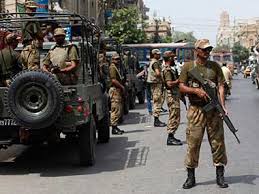
A Strategic Move to Tackle Rising Terrorism
The Pakistani military has launched a large-scale operation in the tribal areas of the country, targeting terrorist groups that have been operating in the region. This operation comes in response to an uptick in terrorist activity, which has included attacks on military personnel, civilians, and critical infrastructure. The tribal areas, particularly in the Khyber Pakhtunkhwa and Balochistan provinces, have long been a hotbed for militant groups, some of whom are linked to international terrorist organizations. The military’s move is seen as a necessary step to restore stability and security in these volatile regions, which have historically been challenging to control due to their rugged terrain and tribal dynamics.
Addressing Local and Global Threats
The operation primarily aims to eliminate local and foreign terrorist elements that have taken refuge in the tribal areas. These groups have been blamed for cross-border terrorism, particularly in neighboring Afghanistan, and for undermining Pakistan’s internal security. The military has stated that the operation will target both terrorist hideouts and those providing logistical support to militants. In addition to neutralizing immediate threats, the operation seeks to curb the broader regional impact of these terrorist networks, which have been a significant destabilizing force in South Asia. By taking a decisive stance against these groups, Pakistan aims to safeguard its sovereignty and prevent further external threats to its security.
A Focus on Counterterrorism and Development
Alongside the military action, the operation will also involve efforts to promote peace and development in the tribal areas. The Pakistani government has recognized that military operations alone will not be sufficient to ensure lasting peace in these regions. Therefore, it is combining security measures with economic development programs, including infrastructure development, job creation, and the restoration of essential services. These initiatives are designed to win the hearts and minds of local populations, who have often been caught in the crossfire of military operations. By addressing both security and socioeconomic issues, the operation aims to create a more stable environment in the long term.
Challenges of the Operation
Despite the military’s confidence in its strategy, the operation faces significant challenges. The tribal areas’ difficult terrain, the presence of well-entrenched militant networks, and the complex tribal loyalties make it hard to root out terrorist elements entirely. Additionally, the region’s proximity to Afghanistan means that militant groups can often cross borders with ease, complicating efforts to control the situation. Local tribal dynamics and the potential for civilian casualties further complicate the military’s task. The Pakistani military will need to navigate these challenges carefully to avoid alienating the population while still effectively targeting the terrorists.
Regional and International Implications
The operation also has broader regional and international implications. For Pakistan, it is an opportunity to demonstrate its commitment to combating terrorism and maintaining regional stability. The operation is likely to have repercussions for Pakistan’s relations with neighboring countries, particularly Afghanistan, where militant groups frequently operate across the border. Additionally, the international community will be closely monitoring the operation, as Pakistan’s counterterrorism efforts are critical to global security. The success or failure of this operation will shape not only Pakistan’s internal security but also its diplomatic relations, as well as its role in broader counterterrorism efforts in the region. If successful, it could significantly disrupt terrorist networks operating in South Asia, contributing to the larger fight against extremism.
Find out how to turn your PUBG skills into earnings with our tutorial

